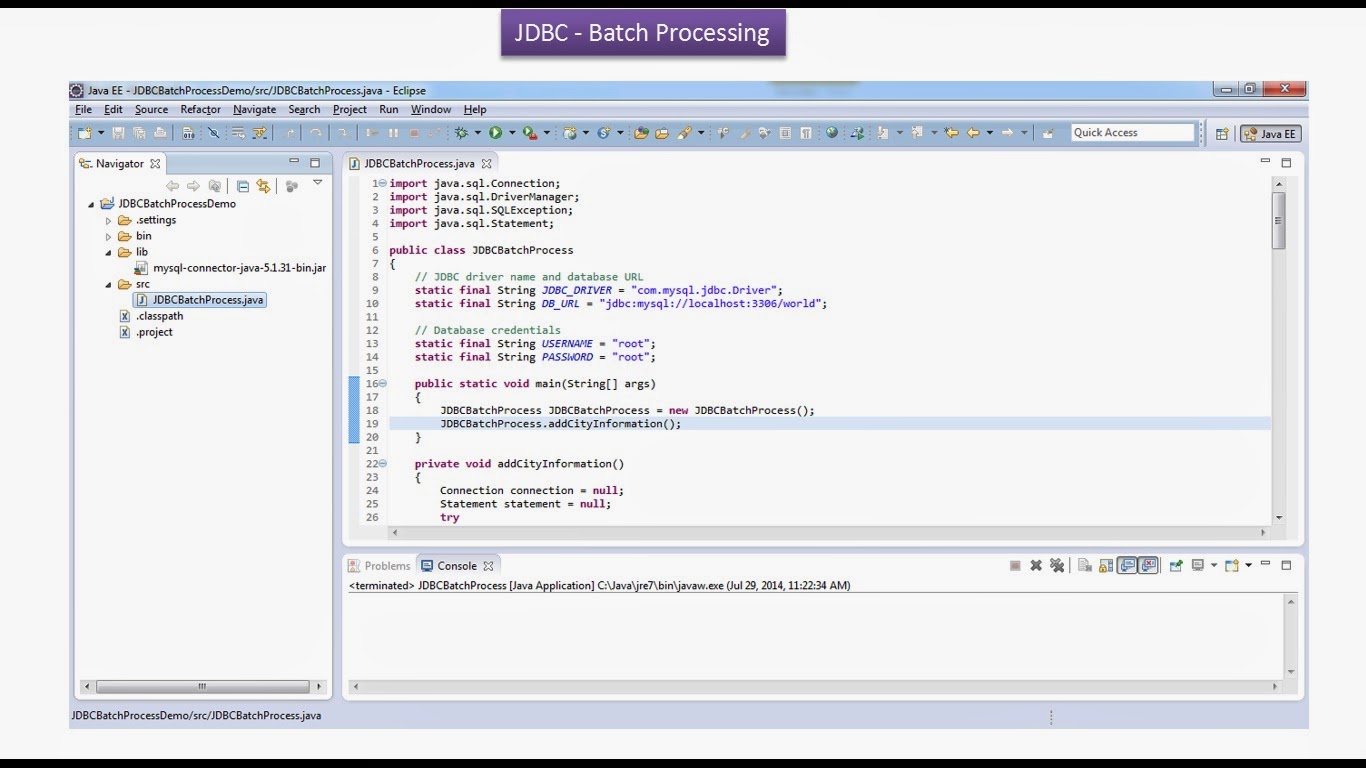Click the below Image to EnlargeJDBCBatchProcessDemo Project Dir Structure  |
| JDBC Batch Processing [Statement] Demo |
 |
| JDBC Batch Processing [Statement] Demo |
JDBCBatchProcess.java import java.sql.Connection;
import java.sql.DriverManager;
import java.sql.SQLException;
import java.sql.Statement;
public class JDBCBatchProcess
{
// JDBC driver name and database URL
static final String JDBC_DRIVER = "com.mysql.jdbc.Driver";
static final String DB_URL = "jdbc:mysql://localhost:3306/world";
// Database credentials
static final String USERNAME = "root";
static final String PASSWORD = "root";
public static void main(String[] args)
{
JDBCBatchProcess JDBCBatchProcess = new JDBCBatchProcess();
JDBCBatchProcess.addCityInformation();
}
private void addCityInformation()
{
Connection connection = null;
Statement statement = null;
try
{
/*
* Register the JDBC driver in DriverManager
*/
Class.forName(JDBC_DRIVER);
/*
* Establish connection to the Database using DriverManager
*/
connection = DriverManager
.getConnection(DB_URL, USERNAME, PASSWORD);
/*
* Set auto-commit to false
*/
connection.setAutoCommit(false);
String sql1 = "insert into city values(5000,'Bangalore','IND','Karnataka',400000)";
String sql2 = "insert into city values(5001,'Channai','IND','TamilNadu',200000)";
String sql3 = "insert into city values(5002,'Thiruvanathapuram','IND','Kerala',800000)";
/*
* Execute the query
*/
statement = connection.createStatement();
/*
* Add sql's to the batch
*/
statement.addBatch(sql1);
statement.addBatch(sql2);
statement.addBatch(sql3);
int result[] = statement.executeBatch();
/*
* Explicitly commit statements to apply changes
*/
connection.commit();
for (int i = 0; i < result.length; i++)
{
System.out.println(result[i]);
}
}
catch (SQLException se)
{
/*
* Handle errors for JDBC
*/
try
{
connection.rollback();
}
catch (SQLException e)
{
e.printStackTrace();
}
se.printStackTrace();
}
catch (ClassNotFoundException e)
{
/*
* Handle errors for Class.forName
*/
e.printStackTrace();
}
catch (Exception e)
{
try
{
connection.rollback();
}
catch (SQLException e1)
{
e1.printStackTrace();
}
e.printStackTrace();
}
finally
{
/*
* finally block used to close resources
*/
try
{
if (statement != null)
{
statement.close();
}
}
catch (SQLException sqlException)
{
sqlException.printStackTrace();
}
try
{
if (connection != null)
{
connection.close();
}
}
catch (SQLException sqlException)
{
sqlException.printStackTrace();
}
}
}
}